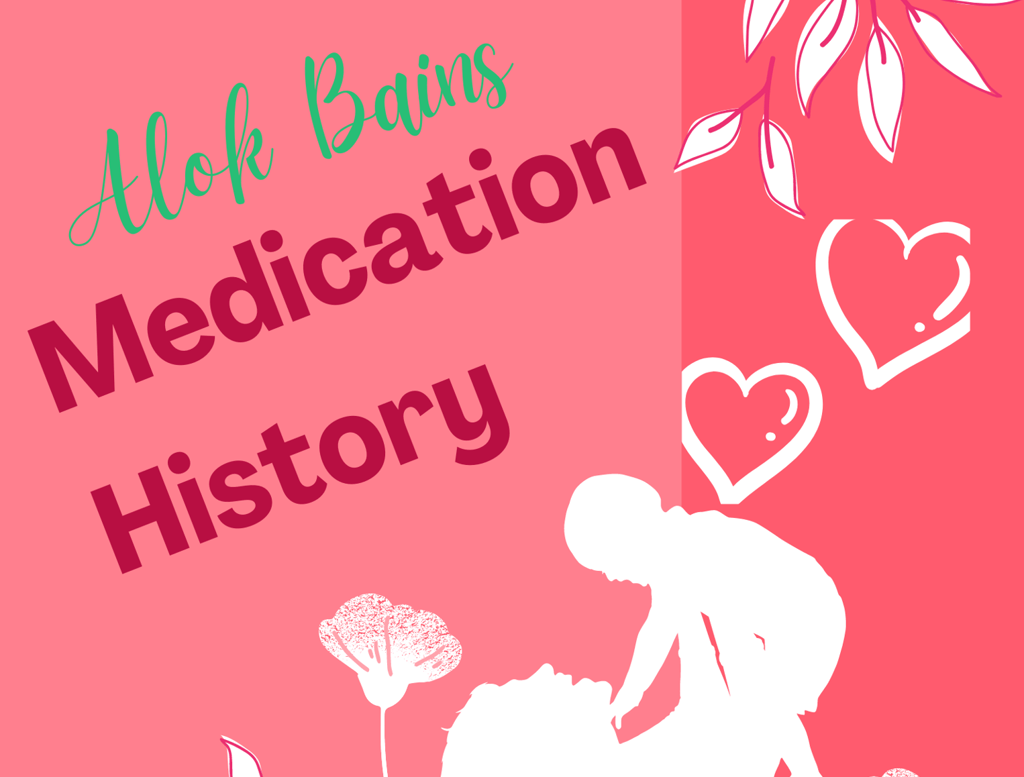Medication History
Medication History Definition, Goal and Procedure
HOSPITAL PHARMACY
Alok Bains
5/12/20233 min read


Medication history
Medication history is a compressive record of all prescription medicines, over-the-counter medicines and any other social medicines used by a patient to prevent diagnose and treat diseases including adverse drug reactions and allergic reactions. Include information such as the name of the medicines, their dosage, route of drug administration, frequency of use, duration of use, side effects, ADR, and allergies.
World Health Organisation promotes obtaining the “Best Possible Medication History” (BPMH) for each patient to decrease errors and to improve patient safety. BPMH is more accurate, comprehensive and complete than routine medication history. BMPH utilises various sources to verify the information.
Benefits of the Medication History
Accurate and complete medication history of the patient is an essential part of the patient’s medical record. It has the following advantages/benefits
Medication history helps healthcare professionals to provide safe, effective and error-free medication to the patient.
Medication history reduces adverse drug reactions and prescription costs.
Medication history helps to detect drug-related pathology due to drug therapy.
Medication history is used at the time of patient admission to the hospital for medication reconciliation. Medication history is the first step of medication reconciliation. Medication reconciliation is a process to identify the most accurate list of medicines, their uses, frequency of administration and their route of administration.
Medical history and medication history are two different components of patient medical records. Medical history includes the patient's medical history, surgical history, history, social history, allergies, medications the patient is taking, medicines recently stopped taking and family medical history
Goal:
“The primary goal of medication history is to prevent prescription error (medication error) and potential harm to the patient during treatment of disease”
“To provide correct medications to the patient at all stages in the hospital. ”
The systemic process to collect information for medication history
Either a pharmacist or medical practitioner can prepare medication history. The pharmacist is a better choice to prepare the medication history of the patient than medical practitioners or nurses. It is because the pharmacist is better educated about the commonly used drugs than medical practitioners or nurses. There is no national guideline to prepare medication history. Following steps are followed for medication history documentation. Pharmacists must introduce themselves and state the purpose of their consultation with these sources.
Collection of Information: Patient interview or caregiver interview, Community healthcare provider interview.
Verification of Information: Use secondary sources or two more sources to verify the medication history.
Information to be documented in the medication history is
Medicines consumed.
OTC medication consumed.
Alternative or Traditional remedies,
Ineffective Medicines.
Vaccinations details.
Any ADR and allergies to medicine.
Adherence to past treatment and
Source of Information
Patient interview: The patient is the primary and most crucial source of information for medicinal history. No other source can replace it. The pharmacist shall create a comfortable and confidential environment to collect information from the patient. Pharmacists shall start with open-ended questions followed by specific questions such as
Medicines consumed both prescription and OTC medicines,
Their dose and route of administration,
Allergic and adverse drug reactions.
Adherence to dose schedule,
Inhalers, Creams/Ointments, Eye drops, Ear drops, Nasal patches, etc.
Patient's own medications/prescription: The patients consume their own medication list. Each medication and the frequency of their consumption must be verified. The patient is the most important source of information due to the following reasons:
The patient frequently changes the medication,
New medication not updated in the medication list,
The medication list may not include all medications such as eye drops, inhalers, OTC drugs, etc,
Family or caregiver,
Medication containers labels,
Medical practitioner Medication list, Referral letter, Phone call.
Community pharmacy dispensing history,
Previous hospital discharge summary,
DPIN (Drug programs information network)
One source is sufficient to prepare medication history if this source is reliable. But it is advisable to use two or more sources to confirm the information. Normally, the patient is the primary source of information and others are the secondary source.
